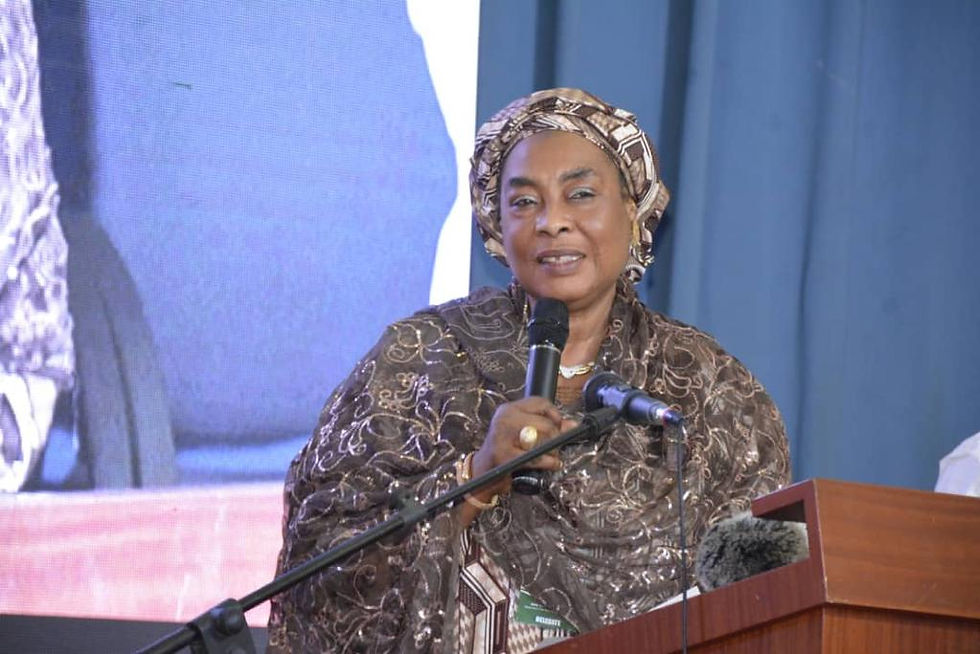Lessons in Leadership
- WLI
- Feb 11, 2025
- 3 min read
An interview between the Women Leadership Institute and Hajia Maryam Inna Ciroma.

WLI: Hajia Maryam, your journey in leadership spans politics, business, and advocacy. Let’s start from the beginning. What was your entry into leadership like?
Hajia Maryam: Well, leadership, for me, started early—long before politics or business. I was the firstborn in a family of 26 children. You can imagine what that was like! I learned responsibility and decision-making from a young age. Later, I pursued political science at Ahmadu Bello University, Zaria, and worked briefly in the Federal Civil Service before transitioning to business. Politics, though, wasn’t initially on my radar.
WLI: So how did politics happen?
Hajia Maryam: Stella Obasanjo had a lot to do with it. She was deeply concerned about the lack of women in governance and kept encouraging me to step into politics. I initially dismissed it, but she was persistent. Eventually, I ran for Senate in 2003 under PDP. I won the primaries, but political dynamics worked against me, and the ticket was given to someone else. Stella was furious about the way I was treated and made sure I was compensated—hence, my appointment as Minister of Women Affairs.
WLI: That’s incredible. What was it like to campaign in such a male-dominated space?
Hajia Maryam: You know, people often assume that gender was my biggest challenge, but it wasn’t. I built my campaign around competence, not my gender. I engaged with communities, traveled across local governments, and listened to people’s concerns. At that point, they weren’t looking at me as a woman; they were looking at me as a capable leader. Even today, my people still encourage me to contest, which tells me I did something right.
WLI: And then you became Minister of Women Affairs. What was the ministry like when you took over?
Hajia Maryam: It was there, but not truly recognized as a full-fledged ministry. Women had fought hard for its creation after the Beijing Conference, but it wasn’t given the same level of importance as, say, Finance or Agriculture. One of my key achievements was securing the ministry’s own headquarters and ensuring it received proper funding. I also worked to push the 35% affirmative action for women in leadership, though unfortunately, the National Assembly didn’t enshrine it into law.
WLI: Do you think women’s leadership issues impact other sectors, like education and healthcare?

Hajia Maryam: Absolutely! Take girl-child education, for example. In northern Nigeria, many girls are still denied education. Some parents believe only boys should go to school. If more women were in leadership, this issue would receive stronger advocacy. The government must step in to ensure every child—boy or girl—has access to education. Without education, how do we even begin to talk about empowerment?
WLI: What makes an effective leader, in your opinion?
Hajia Maryam: Humility, fairness, and integrity. A good leader must put service above self. Corruption is one of the biggest challenges in leadership, and women, especially, must lead by example. When your name is associated with integrity, it doesn’t just impact you—it sets a standard for others.
WLI: You’ve had such an accomplished career. Does leadership ever truly end?
Hajia Maryam: (laughs) Not if you’re alive and well! Leadership isn’t about holding office—it’s about influence. I still mentor young women, engage in national conversations, and contribute where I can. I’m honored to be recognized for my work, but more than that, I’m committed to continuing it.
WLI: What’s your message to the next generation of women leaders?
Hajia Maryam: Be resilient. Don’t let setbacks discourage you. Fight for your rightful place in leadership. Education is key, so take it seriously. And most importantly, unity among women is essential. We must lift each other up instead of waiting for someone to do it for us.
This interview is part of the Women Leadership Institute’s "Lessons in Leadership" series, showcasing the journeys of exceptional women in governance, business, and advocacy.














Comments